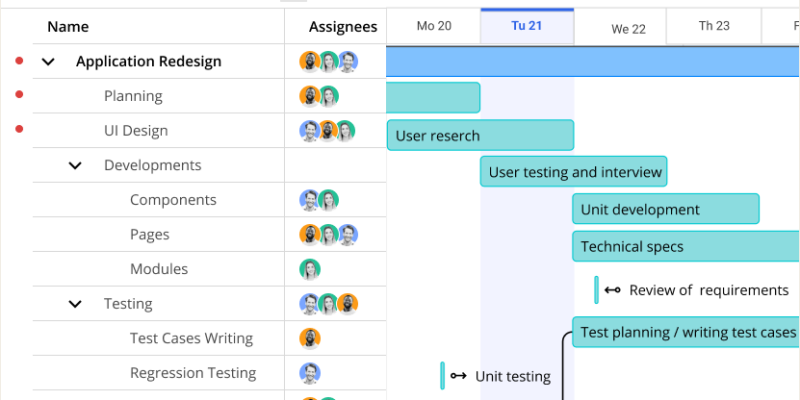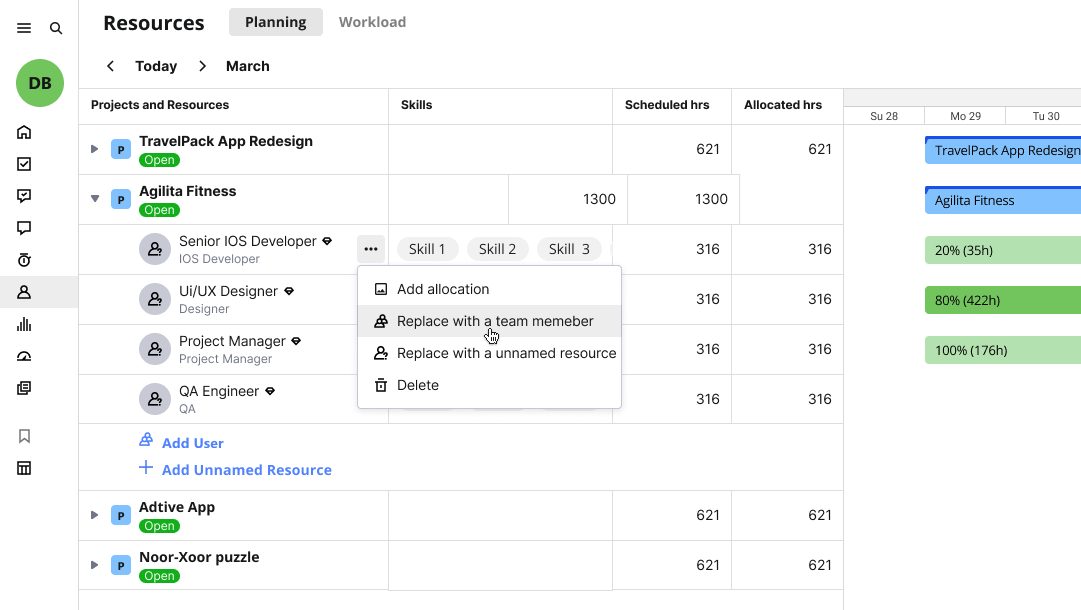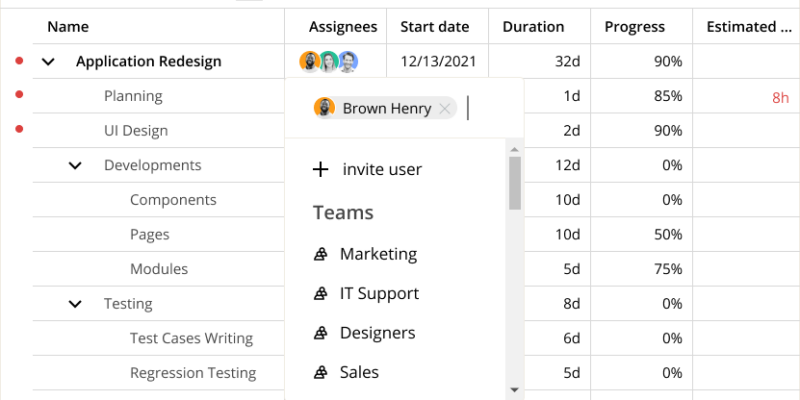Definition
Resource planning and scheduling are two related but distinct processes in project management.
What is resource planning?
Resource planning involves identifying the resources that will be needed to complete a project, estimating the quantity of each resource required, and determining when and how they will be acquired or allocated. Resource planning considers both the availability of resources and the demands of the project and seeks to ensure that the necessary resources are in place when they are needed.
What is resource scheduling?
Resource scheduling, on the other hand, involves the actual allocation of resources to specific tasks or activities within a project. This includes determining the optimal timing for each activity, assigning specific resources to each activity, and managing the use of those resources over time. Resource scheduling seeks to ensure that the right resources are available at the right time and that they are being used in the most effective and efficient way possible.
Together, resource planning and scheduling help to ensure that projects are completed on time, within budget, and to the required quality standards. Effective resource planning and scheduling require a thorough understanding of project requirements, resource availability, and scheduling constraints, as well as effective communication and collaboration between team members and stakeholders.
Key Objectives of Resource Planning and Scheduling
Resource planning and resource scheduling have different goals.
The core objectives of resource planning encompass the following key elements:
- Resource Identification: The first step in resource planning involves comprehensively identifying all available resources within the organization. This includes people, such as employees, contractors, or freelancers, as well as the necessary tools, equipment, and budget required for the project.
- Resource Allocation: Once the resources are identified, the next crucial task is their strategic allocation. This process considers the skill sets, expertise, and availability of each resource. The aim is to match resources with tasks that align with their strengths, leading to heightened productivity and efficiency.
- Resource Utilization: Resource planning strives to optimize the utilization of resources throughout the project lifecycle. By carefully managing resource allocation, overallocation and underutilization are prevented. This approach mitigates bottlenecks and inefficiencies that might otherwise impede project progress.
- Anticipating Requirements: Effective resource planning extends beyond the current project’s scope. It involves anticipating the resource requirements for future projects as well. This foresight allows for better capacity planning, ensuring that the organization has the necessary resources ready to tackle upcoming challenges effectively.
On the other hand, the main objectives of resource scheduling encompass the following key elements:
- Task Sequencing: Resource scheduling ensures that tasks are logically sequenced, with each task starting only after its prerequisites are completed. This sequencing helps maintain order and efficiency in project execution, ensuring a smooth flow of work.
- Time Management: By allocating specific timeframes to each task, resource scheduling keeps the project on track and ensures adherence to deadlines. It helps in avoiding delays and mitigates potential risks associated with project overruns, promoting timely project completion.
- Handling Dependencies: Complex projects often involve tasks that depend on the completion of other tasks. Resource scheduling addresses these dependencies and coordinates efforts to prevent any roadblocks or bottlenecks in the project workflow.
- Real-time Adjustments: In dynamic work environments, priorities may change, unforeseen challenges may arise, or deadlines may shift. Resource scheduling allows for real-time adjustments, ensuring that resources are optimally allocated to address these changes swiftly and effectively.
Well-executed resource planning and scheduling processes ensure that the organization’s resources are leveraged efficiently, leading to successful project outcomes, well-organized task execution, timely delivery, and improved overall organizational performance.
Creating a Resource Plan
Normally, Resource Planning and Scheduling happen at a later stage of a service delivery lifecycle, when a contract is won, and a project or resource manager has more clarity about the project scope. It is a good practice to have the Resource Allocation completed before Resource Planning starts.

Resource plan – is the outcome of the resource planning and scheduling process. It is a dynamic entity that outlines the resources required to complete a project, along with their assignments. A resource plan is usually developed by the project manager or a designated resource manager, and it should be reviewed and updated regularly throughout the project lifecycle.
Assembling Project Team
Once you have your project schedule along with its activities, it is time to add task assignments. You can rely on the previously created resource allocations or start from scratch.
Tasks can be assigned to specific people, or in cases when you are not sure who will be the best fit, a so-called “unnamed resource” can be temporarily placed as a placeholder.

In organizations with a large pool of resources, the task of choosing the right assignee for a task can be quite consuming. A resource manager needs to find everyone who meets the job role criteria, including hard and soft skills, and is also available in the required period of time. Resource management software that can automate this process can definitely save time and make life easier.
Once you have all project tasks created along with their duration, effort level, and people assignment – you have your Resource Plan ready.

What are the requirements for successful resource planning?
Resource planning involves several key items that are essential for its success, including:
Time tracking
This involves monitoring the amount of time spent on each task or project. Time tracking helps to identify areas where resources are being underutilized or where tasks are taking longer than anticipated, which can impact the overall project schedule. It is vital to make sure that it is easy and convenient for the team to track time, otherwise, this practice might be ignored or sabotaged.
Estimation of efforts
Time or effort estimation involves estimating the number of hours required to complete each task or project. Accurate effort estimation helps ensure that adequate resources are allocated to each task, preventing over or underutilization of resources.
Project Schedule
Another key item that is essential for successful resource planning is a detailed list of project tasks along with their duration. It is important to identify and prioritize project tasks based on their level of importance and their dependencies on other tasks. This helps to ensure that resources are allocated appropriately and that the project stays on track.
Resource availability
This involves tracking the availability of each resource, including team members, equipment, and other resources required to complete the project. This includes tracking vacations, holidays, out-of-office hours, and other information related to the people’s workload. It is advisable to find resource management software that includes this functionality or integrates with the company’s HR systems.